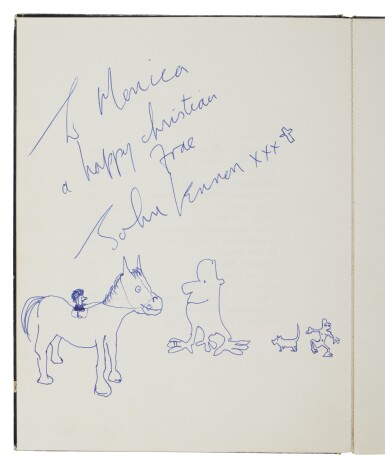
John Lennon | In His Own Write, an extraordinary association copy
Lot Closed
April 18, 02:14 PM GMT
Estimate
6,000 - 8,000 USD
Lot Details
Description
John Lennon
In His Own Write. London: Jonathan Cape, 1964
Small 8vo (177 x 135mm). Text printed in blue and brown, signed, inscribed, and illustrated by Lennon on blank facing "Introduction"; "Introduction" leaf detached but present. Original pictorially printed paper-covered boards; minor rubbing to extremities, some bubbling, spine cocked.
An extraordinary presentation copy, inscribed: "To Monica | a happy christian | [?]| John Lennon xxx"), with an original sketch of a horse and three imaginary figures.
The book was inscribed to Monica, whose sister Maureen Cleave was a journalist best known for her profiles of the Beatles. Cleave, who was good friends with John Lennon, wrote a personality piece about him that would be published in the March 4th 1966 edition of the London Evening Standard. The piece was intended to present a portrait of the "behind-the-scenes" Lennon, and was entitled "How Does A Beatle Live? John Lennon Lives Like This." Unquestionably, the most memorable—or perhaps infamous—part of the piece was Lennon's personal views on the current state of religion:
"Christianity will go. It will vanish and shrink. I needn't argue about that; I'm right and I will be proved right. We're more popular than Jesus now. I don't know which will go first, rock'n'roll or Christianity."
Following the article, Lennon and the band's popularity suffered, particularly in America, where God-fearing audience were outraged at Lennon's claims, perceiving them as vehemently anti-Christian. Indeed, as the band embarked on a 14-city tour, fans across the Bible belt burned their records on public bonfires. The the end of 1966, the Beatles had made the decision to never perform in public again.
Of this cultural moment, Maureen Cleave said: “John was certainly not comparing the Beatles with Christ. He was simply observing that so weak was the state of Christianity that the Beatles were, to many people, better known. He was deploring, rather than approving, this.” Cleave argued that Lennon meant to be ironic, and even thanked Jesus in later works.
Despite this controversy, Maureen remained a trusted member of the Fab Four's inner circle, and they often sought refuge from their screaming fans in her London flat in Maida Vale. Ringo Starr had once noted that when the band toured, the only place safe from such fans was the bathroom of their hotel. Following this comments, the Evening Standard photographed the Beatles along with Maureen in her bathroom for a street poster.
With this, the present inscription by Lennon "a happy christian," can perhaps be understood as a witty referential remark. This signed and inscribed book then, offers a humorous and intimate look into a unique relationship the musician once shared at a pivotal moment in the Beatles' history.
You May Also Like

![[World War II – 21st Army Group] | An important archive of maps and files documenting the allied campaign in Europe, from the early stages of planning for D-Day and Operation Overlord, to the German surrender](https://dam.sothebys.com/dam/image/lot/f958941f-80a5-4c71-935b-c5441da85aa9/primary/extra_small)






![(Hamilton, Alexander, James Madison, and John Jay) | Bushrod Washington's Federalist, praised by George Washington as a "work [that] will merit the notice of Posterity"](https://dam.sothebys.com/dam/image/lot/8ec02b17-38b4-4269-8039-d4830cd55431/primary/extra_small)

